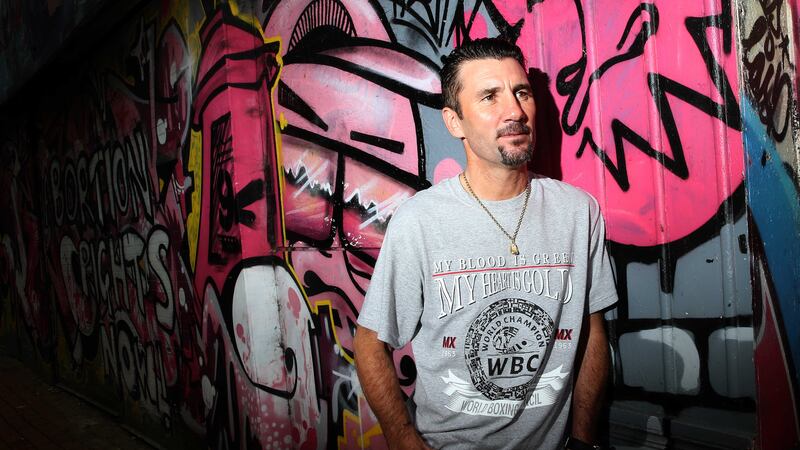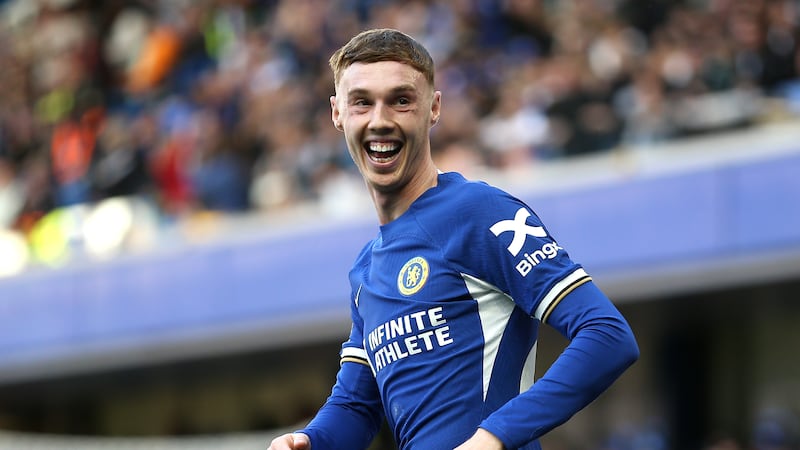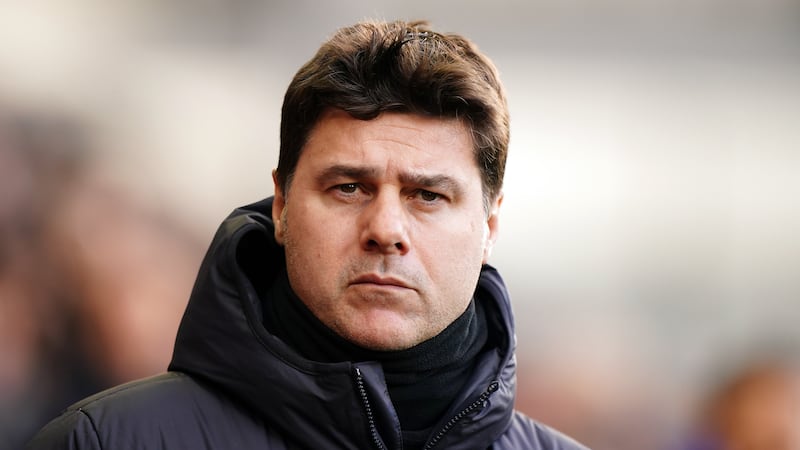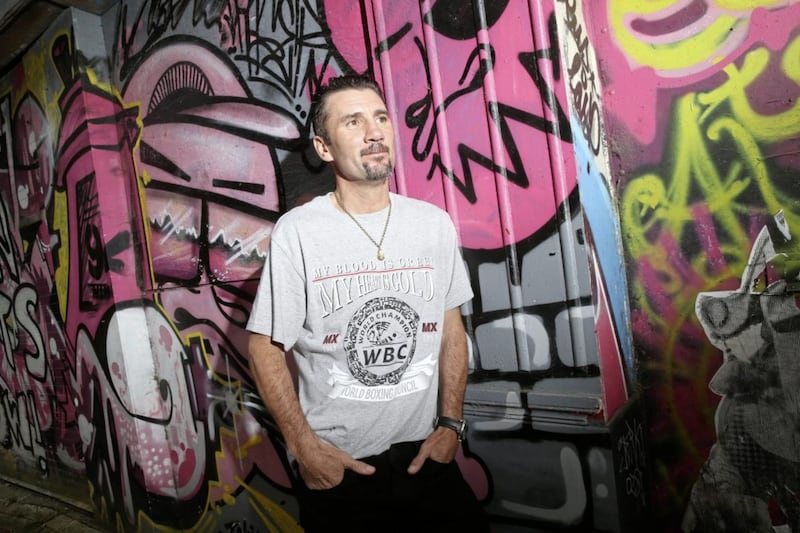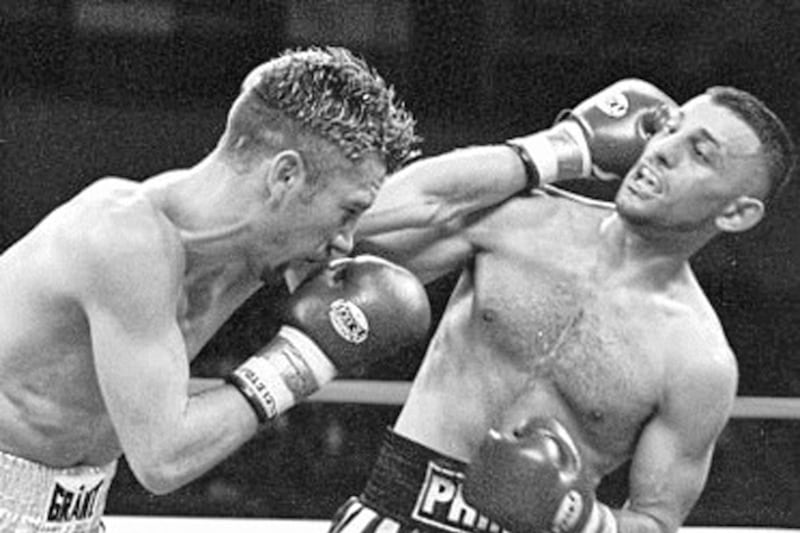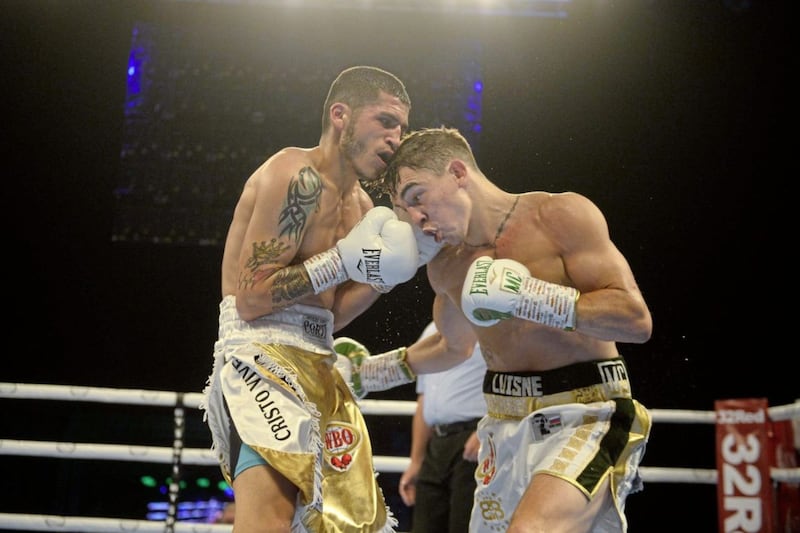NICOLAS Cruz Hernandez will never forget the first time he saw Wayne McCullough in the flesh. Cuba v Ireland, Dublin’s National Stadium, early 1988 – the year of the Seoul Olympics.
Cruz Hernandez was in the red corner. He had brought over a mixture of club fighters and members of the Cuban national team as he visited Ireland for the first time. There to deliver seminars to coaches, Cruz Hernandez was also keen to show those in attendance the practice of what he would be preaching.
The South Circular Road venue was packed, such was the desire of the Irish fight public to cheer on their own against the men in those famous red vests.
The fight of the night, the one anybody who was there still talks about, featured a 17-year-old McCullough.
There was a bit of a buzz beginning to surround the tiny kid from the Albert Foundry club as he bowled over opponent after opponent. Even then, he was box office, as Cruz Hernandez recalls.
“Jesus, he was like a train, unstoppable,” he said.
“I was in the corner of the Cuban, McCullough was given three standing counts and I was saying to my fighter ‘finish him off’. There was no way you were going to finish him off – every time you thought he was done Wayne McCullough would come back and give the Cuban a standing count.
“Wayne stopped him in the last round – this boy, I just couldn’t believe it. He had a block on his face, I mean, come on? We were hitting him with everything but he never gave up...”
He never gave up – the story of Wayne McCullough’s life.
When they told him he was too young to go to Seoul, he never gave up. When he suffered a broken cheekbone during an all-out war at the Olympic semi-final stage in 1992, he never gave up. When blood leaked from the corner of his eye and he found himself two rounds down on finals day in Barcelona, he came roaring back in the third. He never gave up.
Even when McCullough left the amateur game behind, that indomitable spirit remained. Sharing the ring with huge punchers in the pro ranks, he was never put down. Prince Naseem Hamed could crack a bit, so too Victor Rabanales.
At one point during their 1999 brawl in Detroit’s Joe Louis Arena, Mexican legend Erik ‘El Terrible’ Morales hit the ‘Pocket Rocket’ so hard he temporarily thought he was in a hotel room watching a film with wife Cheryl. Did he hit the canvas? Did he hell.
It just wasn’t in his DNA to quit, or take no for an answer.
Getting a place on the team heading to the 1988 Olympics in Seoul was the first of many obstacles that would crop up during a colourful career. True to form, he convinced the powers that be within the Irish Amateur Boxing Association that, despite his tender years, he was the man for the job.
“I beat PJ O’Halloran in my first Irish senior final when I was 17. I stopped him in the third round, but they made us box off again. I had the best record in the Irish team that year – 12 fights in-a-row, I stopped them all,” said McCullough, who was campaigning as a light-fly at the time.
“I beat PJ again, that should’ve been me guaranteed, but they still weren’t going to send me. Then they put me in with a Scottish kid, I knocked him out, then they put me in with a Cuban and I stopped him in the third round.
“I was beating whoever they put in front of me.”
In June that year, they could ignore his claims no longer. McCullough’s last competitive fight before his first Olympics was one which will live in the memory as he stopped the late Arturo Gatti inside a round at Derry’s Guildhall.
Like McCullough, Gatti would go on to garner a reputation as one of the sport’s true warriors. His death in 2009 shocked the boxing world, and to this day McCullough prizes the jersey they exchanged that night.
Like Belfast’s 20-year-old flyweight Brendan Irvine preparing for the start of the Rio Olympics tomorrow, McCullough was the baby of the Irish team. Prior to Seoul ’88, he had never boxed outside of Ireland.
That seems even more incredible when you consider that today the pick of young Irish talent are
globe-trotting by the time they enter their teens and will have clocked up more air miles than Barack Obama by the time they achieve senior status.
Cruz Hernandez was asked to help out before the team travelled to South Korea, and he remembers sitting McCullough down and delivering a few home truths in light of his earlier battle with the Cuban coach’s compatriot.
“I said ‘look, that was a wonderful fight, very good for the public, but for your own sake you need to avoid getting hit’. We started working on ringcraft skills, so he learned to box as well.”
McCullough remembers walking around the Olympic village, awe-struck, as the likes of Carl Lewis walked past and on the night of the opening ceremony he joined the star names on the biggest stage of all when he carried the Irish tricolour into the Seoul Olympic Stadium.
For a protestant from the Shankill Road to carry the Irish tricolour while the Troubles still raged back home was a bold move but, after being asked by Irish Olympic Council president Pat Hickey, the ‘Pocket Rocket’ didn’t give it a second thought.
“I just thought ‘I’m fighting for Ireland – I’m fighting under the flag’.
“I had probably fought for Ireland 50 times and when they asked me I was honoured to do it. I’m a sportsman, not a politician. Anybody who tries to bring politics into sport is an idiot.”
After winning his first fight in a highly-competitive weight class, McCullough bowed out in the second round. His lack of international action told when he was on the receiving end of a big shot from Canada’s Scotty Olson.
“He hurt me with a good body punch in the first round – I’d never been hit with a punch like that.”
Still, experience in the bank, McCullough moved on quickly. Having dreamt of fighting as a professional since he first started boxing, he was keen to turn over after Seoul.
“My style was like a pro style, working the body shots. Barney Eastwood let me train at his gym because my brother was a pro, and I’d get to spar with Dave Boy [McAuley], Paul Hodkinson, Fidel Bassa, I was in the ring with all these guys as a 15-16-year-old kid. You just learned by sparring these guys and by watching…”
Nobody was willing to take a punt on the talented, but raw, teenager just yet. Living at home, unemployed and unable to get a job because employers were unwilling to allow the time off required to pursue his boxing career, times were tough.
A bronze medal at the World Cup in Bombay two years after Seoul won McCullough $1,500, but he was still doing a YTP scheme that saw him clean his local church for a year.
That was until the Olympic Council of Ireland, aware of his desire to turn pro, offered him £500 a month to remain amateur until after Barcelona. While the top boxers in the High Performance Unit are handsomely rewarded these days, McCullough was the first to benefit from this kind of arrangement.
It made a huge difference to his life. Now he could become a full-time athlete and give his full attention to bringing home gold in 1992 – Nicolas Cruz Hernandez certainly believed he was the man to do it.
“The president of Irish boxing, Felix Jones, invited me and my ex-wife, who was visiting from Cuba, down to Kerry and I remember saying to him ‘We are going to bring the big medal home’. I was confident – all my hopes were on Wayne.”
No longer in the opposite corner to McCullough, Cruz Hernandez, alongside Michael Carruth’s father Austin, would be one of Ireland’s coaches in Barcelona Games.
“I had worked with Wayne before he went to the Commonwealth Games in New Zealand in 1990, and you could see the improvement in him all the time,” continued Cruz Hernandez.
“We were at what is now called the Balmoral Hotel in Belfast before they went to New Zealand and I would say he was doing six little sessions a day. Working on footwork, turning here, turning there…
“I used to have tournaments during the day – pool, table tennis – to motivate him and every time he was waiting his turn, he’d be practising the moves, just practising, practising. It was unbelievable, the dedication of that man.”
Going into Barcelona, McCullough and Michael Carruth were the only survivors from Seoul. Whereas 1988 was bonus territory, this time 22-year-old McCullough felt pressure to deliver the medal that would not only secure his
long-awaited move to the paid ranks, but also copper-fasten his legacy within Irish amateur boxing.
Walking around the village, he was no longer star-struck. He had been here before, got the t-shirt. Instead, McCullough found himself in the unlikely position of looking out for 6”6 Clones man mountain Kevin McBride as the 19-year-old suffered pre-fight jitters.
“Kevin had to fight once to get a medal but he was so nervous he couldn’t even tie his own shoelaces, I had to tie them for him. He was a giant, but I was sort of looking after him.
“That’s why I would say even to the likes of Brendan Irvine and the other guys going to their first Olympics – take it all in, go out there and fight to your best ability. You’re an Olympian for life so win or lose, there’s no shame.
“To get there is an achievement in itself, and when you’re out there you just need to relax and not worry about all the crowds and the cameras.”
Now fighting at bantamweight, McCullough negotiated the early rounds with relative ease before meeting North Korean Lee
Gwang-Sik in what many considered the best fight of the Olympic Games.
The ‘Pocket Rocket’ eventually progressed, but at a considerable cost.
“We just stood toe-to-toe,” he recalled.
“He was a hard puncher, and he cracked my cheekbone in three places. It bust a nerve on the side of my nose – the feeling has never come back in that area.”
On the other side of the draw, Cuban Joel Casamayor’s
semi-final had only lasted a round as his opponent was forced to pull out with a dislocated shoulder. McCullough, battered and bruised from his last four exertions, struggled to keep pace with the fresher Casamayor for the first six minutes.
“I remember Casamayor hit me with a straight jab and I was shaking my head – it felt like electricity shooting down my left side. I bled from the corner of my eye underneath my cheekbone, and took a standing count in the second round. Every time he hit me, it felt like I was being electrocuted over and over.
“In the third round I thought ‘f*ck it’, I banged my hands together and went out and won it. Casamayor later told Nicolas that if the fight had gone on another minute he would have lost because he had nothing left.”
Cruz Hernandez confirmed the tale: “If the final had gone on Wayne would have stopped him – there was no room for him in the ring any more.
“The next year we went to the World Championships in Finland and when I saw Casamayor, the first thing he said to me was: ‘did you bring that headcase with you again?’”
Despite his final round heroics, McCullough had to settle for a silver medal – the first since Fred Tiedt in Melbourne in 1956 – and an hour later Carruth became the first, and still the only, Irishman ever to win a gold medal.
The Olympics Games provided the springboard for Wayne McCullough to fulfil the dreams he had held since first stepping between the ropes under the watchful eye of Harry Robinson.
The Irish Amateur Boxing Association tried to get him to stay on for the Atlanta Games, but McCullough’s mind was made up. Within six months the self-professed “homebird” had made his pro debut in America, and was being trained by the legendary Eddie Futch.
Twenty-three years on, he is still living in Las Vegas.
He would love to have pipped Carruth to the post, but it just wasn’t meant to be.
“I didn’t get the medal I was looking for but everybody got to see me, and people liked my style,” he said.
“The Olympic Games was just an unbelievable experience from start to finish. It’s something that stays with you for the rest of your life.”
